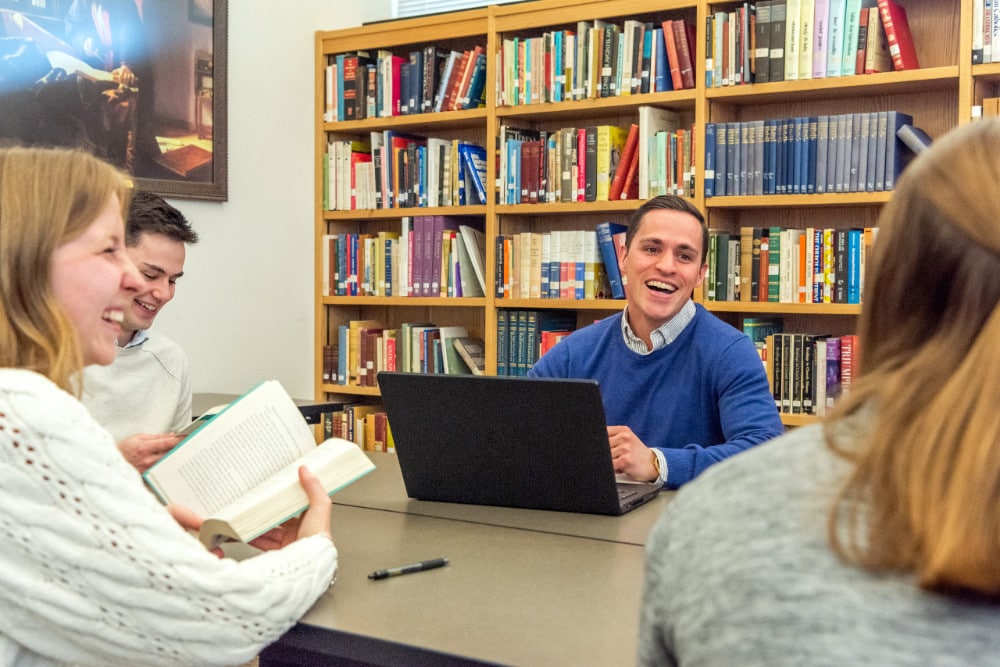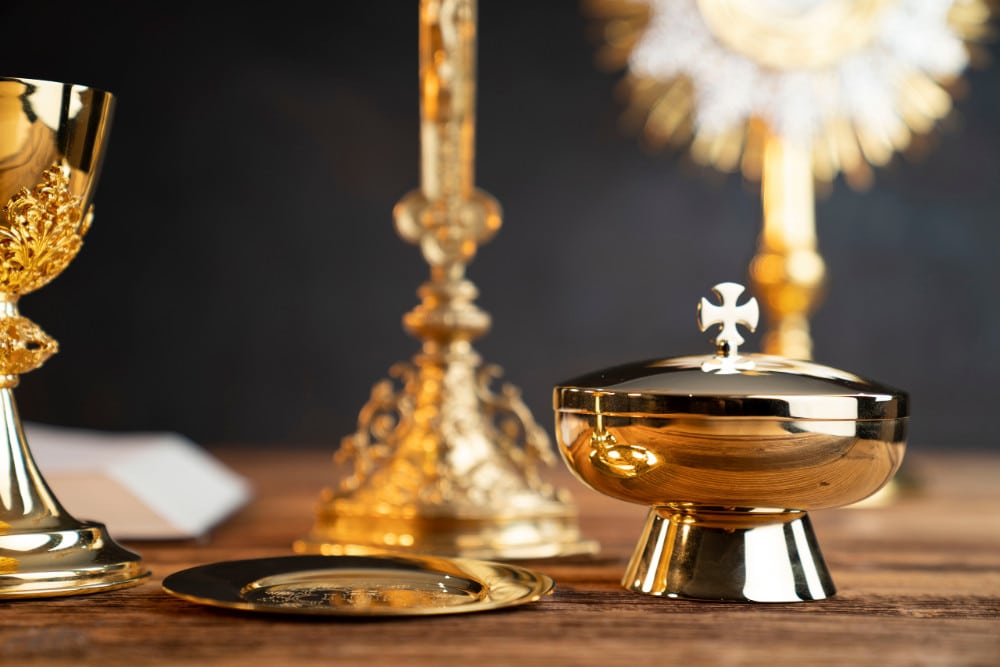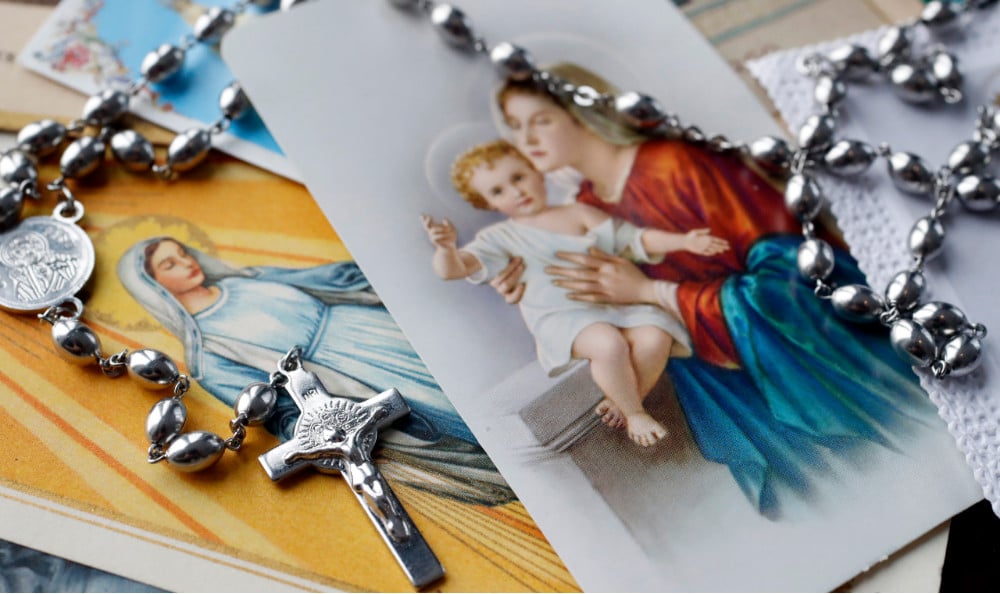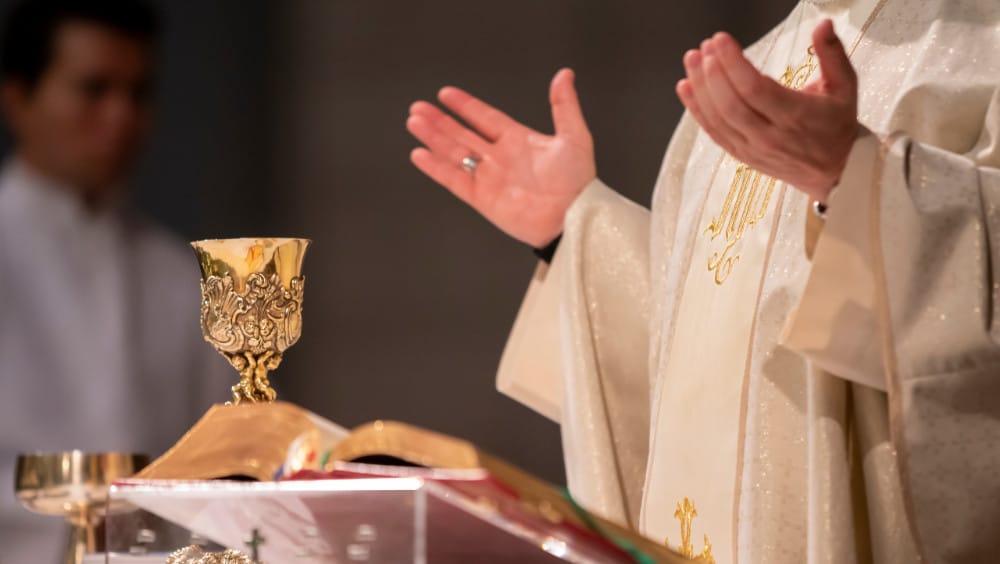Did attending a Catholic college prepare you to know and defend your faith? That question was posed on social media. Responses varied. Here is a sampling in the negative with names and schools withheld.
“Uh … sorry, I went to the University of _____ … ’nuff said.”
“Graduated from _____ in 1981. I’m still recovering … and repenting.”
“As much as I appreciate my education, the school did not provide that for me.”
“No, I was not prepared, unfortunately! I got a good education but that was it. Sad.”
Read more Fall College section articles here.
Other graduates told very different stories. Our Sunday Visitor contacted Catholic colleges and universities across the country to find out what they were doing right. One thing they all had in common was a goal to educate students, regardless of major, with a deep understanding and appreciation for the Catholic faith.
Kyle Washut, academic dean at Wyoming Catholic College, a small liberal arts school in Lander, Wyoming, explained that eight semesters of theology and philosophy classes provide a fundamental groundwork for students. Classes cover proofs of the existence of God, salvation history, the Bible, moral social teaching — which includes studying Pope St. John Paul II’s encyclical Veritatis Splendor — the sacraments and moral theology.
“Students engage in some set of objections to the mysteries of the Faith each semester,” Washut said. “For instance, in junior year, students read Martin Luther and how the Council of Trent responded, reaffirming Church authority and centrality of the Church.”
Another assignment, he said, is responding to Stephen Hawking, the famous physicist and ardent atheist who died in 2018.
“Students read his arguments and contrast it with the Catholic view of redemption,” Washut said. The educational experience as a whole, he explained, comes through classes that instill principles and is cultivated through small-group involvement and discussions, learning habits of faith that continue outside of the classroom.
The people who I met changed the way I see the world and motivated me to become a better person,” said Jessica Mattson, a 2013 graduate of Wyoming Catholic College. “I learned so much about who I am in the body, mind and spirit. I am still regularly reminded and inspired by my peers and the faculty and staff, who I had the greatest joy of getting to know through my WCC years.”
‘Joyful Catholicism’
Stephen Hildebrand, chair of the theology department at Franciscan University in Steubenville, Ohio, explained that even nonreligion majors choose from theology and philosophy classes that focus on four pillars: foundations of Catholicism in the Creed, Christian moral principle, the word of God in Scripture, and prayer.
“At Franciscan University, there is a kind of integrity to both the philosophy and theology core that our students will need as they get out and face a hostile culture,” Hildebrand said. “The truth of the Faith is relevant to the culture, so it comes up in class all the time.”
In theology, for instance, Hildebrand noted that studying creation helps students to understand that the human person has a certain dignity, and that God made us male and female, which is under attack in our culture. “Sound Christian moral principles are studied, such as the moral theory that undergirds Pope John Paul II’s Veritatis Splendor; students also learn Veritatis Splendor’s refutation of proportionalism, the moral theory that dominates moral discourse in our time.”
Shannon Marie Federoff told Our Sunday Visitor that her time at Franciscan University still impacts her today, 30 years after graduation. “What it gave me was a basic education in doctrine, but many, many examples of joyful Catholicism lived out in the lives of students and professors — and the friars! I met people there who knew Jesus. And after a while, I realized I wanted that, too.”
Building friendships
At the University of Mary in Bismarck, North Dakota, Donald Bungum, chair of the philosophy program and an assistant professor of philosophy and Catholic studies, explained that the school’s theology program includes sacramental, biblical, moral and historical theology.
All these theology courses integrate with the philosophy and Catholic Studies programs so that many students double- or triple-major in these areas.
“We train our theology students like the first missionaries to America, who needed to have the whole of faith, learning and culture packed into their souls,” Bungum said. All students take at least two philosophy courses and two theology courses, regardless of major.
“Apologetics plays a role in forming our students to become pillars of Catholic culture in their future communities,” Bungum explained. He noted that UMary is unique for how it applies St. John Henry Newman’s principle of “personal influence” to apologetics. “UMary students are taught to win both arguments and persons by attending to the appeal of secular worldviews and the larger imaginative vision of people who hold them,” he said. “Our approach makes students into fishers of men: They hook with friendship and land with the truth. Friendship is a key word at UMary — friendship with Christ, friendship with the truth, friendship with faculty and friendship with each other.
“Everything from our 24-hour dining to our Thursday dinners at Catholic Studies House, to our Saturday afternoon disputatios, to our Rome and ASU [Arizona State University] programs are designed to addict students to friendship in the truth. It has been said that people go to heaven and hell in groups. We work to get students into the right ones.”
Teresa McKeown, a 2017 graduate of the University of Mary, pointed to how life outside the classroom impacted her faith. “They did a great job of making the Catholic faith a big deal and something you wanted to grow deeper in. The homilies, even at a daily Mass, were filled with understandings of our faith in relation to the culture. There were many weekly events that encouraged students to gather and listen to speakers talk about important aspects of the faith, amazing stories, or even just how our Catholic faith and servant leadership is our calling no matter what field we go into.”
‘A vision of the whole’
At Ave Maria University near Naples, Florida, Michael A. Dauphinais, the chair of the theology department, said that all students receive Catholic theology through courses in Scripture, doctrine and moral theology. “These courses take seriously objections to Catholic teaching,” he said, “and show that there are good responses when one understands what the Church actually teaches and why she teaches it.”
Dauphinais explained that students are offered a vision of the whole that leads to discovery of how the Faith offers meaning and purpose in this life and the hope of glory in the next. “Most objections to the Catholic faith or questions about it are rooted in a failure to see that bigger picture of God’s creative and saving love,” Dauphinais said. “When seen in this light, the specific teachings of the Church in faith and morals do not constrict human freedom but offer us the genuine freedom to live the ‘abundant life’ promised by Jesus Christ.”
Caitlin Desume, a 2018 graduate of Ave Maria University, said her education helped prepare her to defend her faith in the world. “Zeal for the faith grew. I never felt force-fed; my professors taught me how to ask questions and seek the truth, which naturally sets a person on the right path. I truly believe Catholic liberal arts schools will save our world.”
Patti Maguire Armstrong writes from North Dakota.







